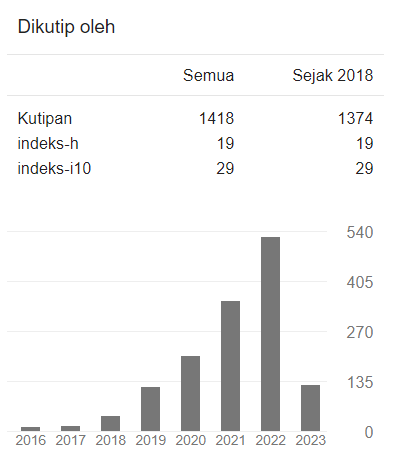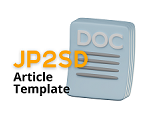Pengembangan E-Modul Dengan Bermuatan Karakter Mandiri Pada Materi Jenis-Jenis Usaha Dalam Bidang Ekonomi Kelas V Sekolah Dasar
DOI:
https://doi.org/10.22219/jp2sd.v12i1.30947Keywords:
learning media, e-moduls, types of businesses in the economic sectorAbstract
The lack of variety of innovative teaching materials in learning is a significant problem because it can cause students to feel bored and less enthusiastic and find it easier to concentrate when understanding the material. The impact is that student learning achievement, especially in social studies subjects covering types of business in the economic field, becomes low, while the level of student independence also decreases. This research aims to develop learning media in the form of e-modules for material on types of business in the economic sector by including elements of independent character. Its validity will be evaluated by experts and is expected to become a practical tool for teachers and students of class V SDN Kauman 02 Blitar City. It is getting an average score of 87.88% from material experts and an average score of 97.6% from media experts, with both categories being very valid. Meanwhile, the practicality test received an average score of 94.5% from teachers in the very practical category, 94.4% from small group assessments in the very practical category, and 95.4% from large group assessments in the very practical category. The effectiveness of the assessment on student learning achievement was evaluated through a t-test with the help of SPSS and produced a value of 0.000, which indicates that 0.000 < 0.05. Thus, it can be concluded that the null hypothesis (Ho) is rejected, and the alternative hypothesis (Ha) is accepted. These results indicate an increase in student learning achievement in class V of SDN Kauman 02 Blitar City using e-module learning media, which is proven by the average of pre-test and post-test learning results. Overall, based on research findings, e-modules with material on types of business in the economic field are considered feasible by experts and practical to be applied in learning activities to improve student learning achievement.
Downloads
References
Akhmadi, M. N., Rufi’i, & Hartono. (2021). Pengembangan E-Modul Ips Sd Berbasis Kontekstual Materi Menghargai Peninggalan Sejarah Di Lingkungan Setempat. Jurnal Teladan: Jurnal Ilmu Pendidikan Dan Pembelajaran, 6(2), 75–84.
Amaliyah Batubara, F. (2018). Desain Instruksional (Kajian Terhadap Komponen Utama Strategi Instruksional dan Penyusunannya): Vol. III (Issue 2).
Ariadi Cahya Dinata, P., & Zainuddin, M. (2016). Self Regulated Learning Sebagai Strategi Membangun Kemandirian Peserta Didik Dalam Menjawab Tantangan Abad 21.
Arifin, M. S. (2015). Pengembangan Materi Pembelajaran.
Astuti, V. D., Muthmainnah, R. N., & Rosiyanti, H. (2021). Pengembangan Media Pembelajaran Aplikasi Pokamath Pada Materi Aljabar Kelas VII. FIBONACCI: Jurnal Pendidikan Matematika Dan Matematika, 7(1), 1. https://doi.org/10.24853/fbc.7.1.1-10
Branch, R. M. (2008). Augmenting the ADDIE Paradigm for Instructional Design. 48(6), 16–19.
Dwiyono, O. : (2017). Pengembangan Game Edukasi Sebagai Media Pembelajaran Interaktif Pada Kompetensi Dasar Mendeskripsikan Penggunaan Peralatan Tangan (Hand Tools) dan Peralatan Bertenaga (Power Tools) Education Game Development As Interactive Learning Media Of Describes Hand Tools And Power Tools Subject. http://journal.student.uny.ac.id/ojs
Fahri, M. U. (2020). Penerapan Teknologi Website dan Email Dalam Proses Pembelajaran. https://sites.google.com/
Hasan, M., Milawati, Mp., Darodjat, Mp., & DrTuti Khairani Harahap, Ma. (2021). Makna Peran Media Dalam Komunikasi dan Pembelajaran │Media Pembelajaran.
Herawati, N. S., & Muhtadi, A. (2018a). Pengembangan modul elektronik (e-modul) interaktif pada mata pelajaran Kimia kelas XI SMA. Jurnal Inovasi Teknologi Pendidikan, 5(2), 180–191. https://doi.org/10.21831/jitp.v5i2.15424
Herawati, N. S., & Muhtadi, A. (2018b). Pengembangan modul elektronik (e-modul) interaktif pada mata pelajaran Kimia kelas XI SMA. Jurnal Inovasi Teknologi Pendidikan, 5(2), 180–191. https://doi.org/10.21831/jitp.v5i2.15424
Kaulan, M., & Ramadhani, K. D. (2018). Permasalahan Pembelajaran IPS dan Strategi Jitu Pemecahannya.
Kristanto, A. (2016). Media Pembelajaran.
Kustandi, C., Farhan, M., Zianadezdha, A., Fitri, A. K., & L, N. A. (2021). Pemanfaatan Media Visual Dalam Tercapainya Tujuan Pembelajaran. Akademika, 10(02), 291–299. https://doi.org/10.34005/akademika.v10i02.1402
Najuah, Lukito, P. S., & Wirianti, W. (2020). Modul Elektronik Prosedur Penyusunan dan Aplikasinya. I, 1–50.
Najuah, Lukitoyo, P. S., & Wirianti, W. (2020). Modul Elektronik: Prosedur Penyusunan dan Aplikasinya.
Nashrullah, M., & Pd. (2022). Pembelajaran IPS (Teori dan Praktik). www.elpublisher.com
Nurjanah, S. (2022). Menciptakan Suasana Pembelajaran yang Menyenangkan Melalui Metode Tanya Jawab.
Primadini, F., Nadiroh, Edwita, & Lamria. (2019). Pengaruh Media Pembelajaran dan Kemandirian Belajar Terhadap Keterampilan Proses IPA di Sekolah Dasar. Volume 10 No 2, 281–293.
Ramadhan, W., Meisya, R., Jannah, R., & Putro, K. Z. (2023). E-modul Pendidikan Pancasila Berbasis Canva Berbantuan Flip PDF Profesional untuk Meningkatkan Hasil Belajar Siswa Sekolah Dasar. Jurnal Pemikiran Dan Pengembangan Sekolah Dasar (JP2SD), 11(2). https://doi.org/10.22219/jp2sd.v11i2.27262
Rihanah, A., & Irma, C. N. (2022). Kelayakan Isi dan Bahasa Pada Buku Teks Bahasa Indonesia di SMA Negeri 1 Sirampog. Hasta Wiyata, 5(1), 32–42. https://doi.org/10.21776/ub.hastawiyata.2022.005.01.03
Sa’ban, M., Misnah, & Gagamurusu, Y. (2016). Meningkatkan Hasil Belajar IPS Pokok Bahasan Macam-Macam Usaha dan Kegiatan Ekonomi Di Indonesi Dengan Menggunakan Metode Role Playing Pada Kelas V SDN No. 1 Bou Kabupaten Dongala. In Jurnal Kreatif Tadulako Online (Vol. 4, Issue 1).
Sugiyono. (2016). Metode Penelitian Kuantitatif, Kualitatif dan R&D. CV Alfabeta.
Trinova, Z. (2012). Hakikat Belajar dan Bermain Menyenangkan Bagi Peserta Didik. Jurnal Al-Ta’lim, Jilid 1, Nomor 3, 209–215.
Zainal, Y. (2011). Meningkatkan Pemahaman Jenis- Jenis Usaha Dalam Masyarakat Pada Mata Pelajaran IPS Melalui Model Interaksi Edukatif di Kelas V Madrasah Ibtidaiyah Negeri I Pekanbaru.
Downloads
Published
Issue
Section
License
Copyright (c) 2024 Silvi Meilasari, Yohannes Kurniawan Barus, Erif Ahadianto

This work is licensed under a Creative Commons Attribution-ShareAlike 4.0 International License.
Authors who publish with Jurnal Pemikiran dan Pengembangan Sekolah Dasar (JP2SD) agree to the following terms:
- For all articles published in Jurnal Pemikiran dan Pengembangan Sekolah Dasar (JP2SD), copyright is retained by the authors. Authors give permission to the publisher to announce the work with conditions. When the manuscript is accepted for publication, the authors agree to automatic transfer of the publishing right to the publisher.
- Authors retain copyright and grant the journal right of first publication with the work simultaneously licensed under a Creative Commons Attribution-ShareAlike 4.0 International License that allows others to share the work with an acknowledgment of the work's authorship and initial publication in this journal.
- Authors are able to enter into separate, additional contractual arrangements for the non-exclusive distribution of the journal's published version of the work (e.g., post it to an institutional repository or publish it in a book), with an acknowledgment of its initial publication in this journal.
- Authors are permitted and encouraged to post their work online (e.g., in institutional repositories or on their website) prior to and during the submission process, as it can lead to productive exchanges, as well as earlier and greater citation of published work (See The Effect of Open Access).

This work is licensed under a Creative Commons Attribution-ShareAlike 4.0 International License.


















